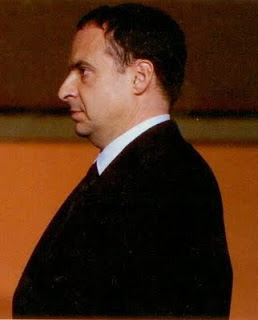
Our rendezvous took place at 7 p.m. in Bar Americaine at Hotel de Paris.
“What has the Prince told you about me?” I asked, not wishing to waste time covering old ground.
“CIA, FBI, DST…” LACOSTE bobbed his head, eyelids fluttering imperiously.
“Good. So you know what I do.”

Lacoste
LACOSTE said he had "no objection" (!) and proclaimed it “useful,” though qualified this by moaning about the FBI having kept files on his mother, Nadia LACOSTE, a U.S. American who once handled media relations for the Palace, while, he said, the DST believed her to be a CIA agent. This apparently had left LACOSTE with disdain for intelligence services.
The Croc lost no time informing me of his status as the Prince’s “best friend”--the same status claimed by Robert MUNSCH (and others). Though when I mentioned Dr. Mooch, it was a mystery to LACOSTE (as to everyone) why the Prince continued to tolerate such a pushy leech.
LACOSTE was familiar with our investigations into Franck BIANCHERI and Philippe NARMINO. He ventured the opinion that BIANCHERI should be sent far away (“as ambassador”) and that the allegations against NARMINO were “probably true.” The problem, he said, was that NARMINO had been promised the top Justice job by Prince Rainier three years before.
Nobody seemed to understand one simple fact: Prince Rainier was dead.
Furthermore, during most of the last five years of his life, Prince Rainier had been very ill, and those around him had exploited his incapacity to think clearly.
It should not have mattered what Rainier promised to anyone because: a) he was gone and b) he was not in his right mind when he’d made such promises.
Prince Albert II, as current Sovereign, should be able to make his own decisions without having to honor promises he himself never made.
I mentioned Carl CARLSSON, about whose trail of bankruptcies the Prince had been briefed, and who the Prince knew by then to be bandying his name to attract new investors/suckers, but continued to enjoy access to the royal entourage.
LACOSTE expressed concern, explaining that the Prince was “too nice,” which is what almost everyone said about him. (Those who knew Prince Albert well used nice as a euphemism for weak.)
The Croc had a matter of his own he wished to discuss. He had an important client resident in the principality, a Lebanese national named Samy MAROUN.
MAROUN had a little problem.
Like many in Monaco who suffered Albertitis, MAROUN wanted to buy a table at the Princess Grace Foundation Gala. The problem was, this gala takes place in New York City, and MAROUN was frightened to travel to the United States.
Something about having dealt in embargoed oil and Iraqi Food for Oil corruption.
LACOSTE asked me these questions: Was MAROUN on a US watch list? Would he be stopped at Immigration and hassled if he attempted to enter the USA?
LACOSTE offered me payment to find out.
I declined this assignment, explaining to The Croc that I worked only for the Prince and that I strenuously avoided any conflict of interest, which included receiving payment from any other person or entity.
I hoped LACOSTE had learned something from this exchange, for it was quite outrageous in my mind that, on one hand, The Croc was trying to influence—and even manage—the Prince’s decision-making in Monaco while, on the other, not only representing Monaco-based clients, but representing shady clients whose continued presence in the principality was detrimental to the “new ethic” the Prince was publicly promoting (if not actually executing).
But my point sailed over The Croc’s head.